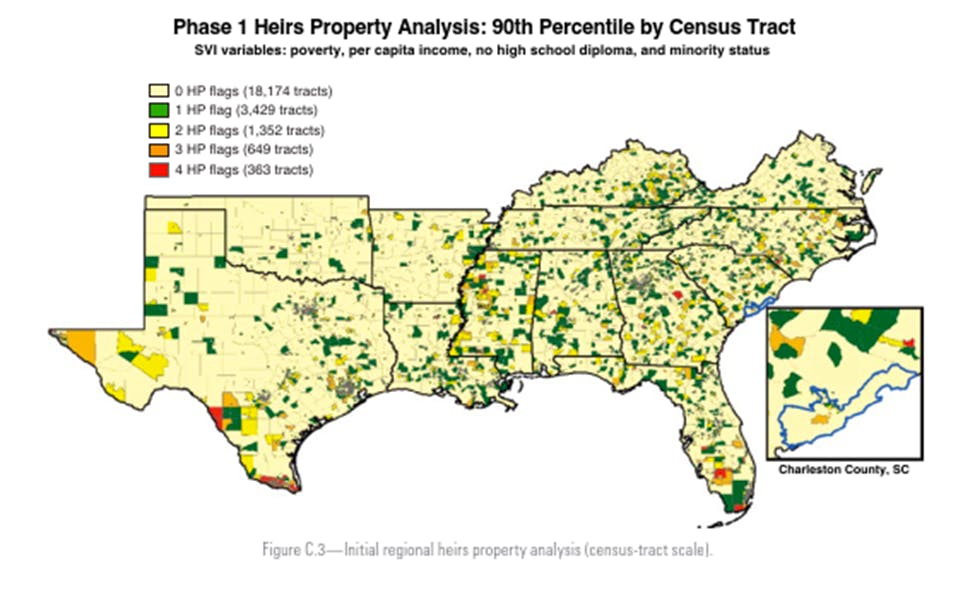Defenders of Wildlife organized an unique working group of social justice, housing and environmental supporters and lobbied the 2020 Florida Legislature which unanimously passed the Uniform Partition of Heirs Property Act (UPHPA) and was enacted by Governor Ron DeSantis on June 20, 2020. This Act helps families clear title to their land and qualify for farm loans, crop insurance and disaster aid so they can better manage their land and the wildlife habitat provided by their land.
Less affluent families with smaller estates are more likely to use a simple will or to not have made a will before dying. Often, these families do not have the funds to hire a lawyer or estate planner to ensure their property, the family’s most valuable asset and reservoir of accumulated wealth, is smoothly transferred to the next generation. If the landowner dies without a will, the land passes to the owner’s heirs under state law whether those family members maintain any connection to the family or property. When two or more people have ownership interests in a property, that ownership is vulnerable because any individual owner can force a partition. For this reason, partition sales are common and these partition sales can contribute to urban sprawl through the conversion of agricultural or forested land to uses with greater development intensity. This conversion often results in the land being less suitable as habitat for species such as threatened gopher tortoises whose burrows are used by over 350 commensal species including endangered Eastern indigo snakes.


Too often, real estate speculators acquire a small share of heirs’ property through the sale by an heir to file a partition action and force a sale. Using this tactic, a speculator or developer can force the family to sell all their land for a price well below its fair market value, even fire sale prices, and deplete a family’s inherited wealth in the process. Further, legal fees may consume 20 percent of the proceeds of the sale. In this manner, the transfer of wealth between generations is broken, first by lack of estate planning, and second by a forced partition sale. The people who benefit generally are real estate investors, developers and their lawyers.
Additional heirs’ property is created because 55% of all adults and 72% of nonwhite adults do not have a will. To help understand the scope of family heirs’ property issues in the South, the Federal Reserve Bank of Atlanta found that heirs’ property is disproportionately high among low-income and low-wealth households and racial and ethnic minority groups, but property owners are of every race and ethnicity with all kinds of properties. For many decades, large numbers of disadvantaged families in Florida, including a disproportionate number of African American families, have had their heirs’ property forcibly sold as a result of an unjust property law known as partition law.


(Left from “Identifying Potential Heirs Properties in the Southeastern United States”, USDA Forest Service, e-General Technical Report SRS-225, September 2017 and right from “Understanding Heirs' Properties in the Southeast”, Federal Reserve Bank of Atlanta)
The UPHPA protects all owners of heirs’ property and preserves their right to keep or sell their property. It preserves the right of a co-owner to sell his or her interest in inherited real estate, while ensuring that the other co-owners will have the necessary due process to prevent a forced sale. This property rights law provides a series of simple due process protections: notice, appraisal, right of first refusal, and if the other co-owners choose not to exercise their right and a sale is required, a commercially reasonable sale supervised by the court to ensure all parties receive their fair share of the proceeds. UPHPA only applies to a small percentage of partition actions (ownership-in-common properties) and only when there is no written agreement governing partition among the owners.
Defenders supported passage of this law to help address these and other social and economic issues associated with heirs' properties. In addition to the loss of intergenerational wealth among vulnerable populations, families risk losing land to unpaid taxes (tax foreclosures), fines associated with nuisances, difficulty selling land, and the property has no value as collateral for conventional home mortgages or loans. This limits heir’s property owners’ ability to access disaster recovery support for assistance with farming operations.
Passage of UPHPA enables heirs’ property owners to take advantage of provisions of the 2018 Farm Bill. It allows them to qualify for federal programs including crop insurance and disaster aid, and farm loans for development of dormant farmland or legal expenses incurred by heirs to clear title to property owned by a deceased relative. With passage of UPHPA in Florida, our state’s heirs’ property owners have the same qualifying requirements for federal programs as do farmers and ranchers in the 16 other states and the U.S. Virgin Islands that have enacted the UPHPA. Florida’s enactment of the UPHPA will hopefully encourage other states to enact it into law.
The Florida Legislature passed this bill in the first session it was introduced because of the tremendous leadership of Representative Loranne Ausley from Tallahassee and Senator Randolph Bracy from Orlando and their staff who shepherded the bills successfully through all their committee stops and on the floor in each chamber. Helping Florida families access federal disaster aid for farms and forests damaged by Hurricane Michael earned bipartisan support for the bill. Texas A&M University School of Law professor Thomas Mitchell, the author of the UPHPA, Ben Orzeske of the Uniform Commission, private attorney Jami Coleman, and Karen Woodall of the Florida Center for Fiscal and Economic Policy all provided expert testimony at key Judiciary Committee meetings and worked with the Real Property, Probate and Trust Law Section of the Florida Bar to gain their support. Defenders of Wildlife’s lobbyist Travis Moore guided us and removed hurdles throughout the legislative process. Dr. Sandra Thompson of Florida A&M University educated us and brought like-minded people together to lay the foundation for this legislative achievement for family heirs’ property owners. Defenders is now looking for partners to help identify heirs’ property owners, and recruit legal aid organizations and land trusts in Northwest Florida to take advantage of this new law to keep family land in the family and protect working farmland and wildlife habitat.









